11 start with C start with C

Compelling and humane, this book reveals the lives of the 300,000 child soldiers around the world, challenging stereotypes of them as predators or a lost generation. Kidnapped or lured by the promise of food, protection, revenge, or a better life, children serve not only as combatants but as porters, spies, human land mine detectors, and sexual slaves. Nearly one-third are girls, and Michael Wessells movingly reveals the particular dangers they face from pregnancy, childbirth complications, and the rejection they and their babies encounter in their local contexts.
Based mainly on participatory research and interviews with hundreds of former child soldiers worldwide, Wessells allows these ex-soldiers to speak for themselves and reveal the enormous complexity of their experiences and situations. The author argues that despite the social, moral, and psychological wounds of war, a surprising number of former child soldiers enter civilian life, and he describes the healing, livelihood, education, reconciliation, family integration, protection, and cultural supports that make it possible. A passionate call for action, Child Soldiers pushes readers to go beyond the horror stories to develop local and global strategies to stop this theft of childhood.
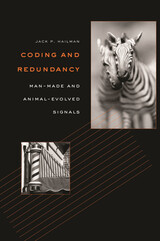
This book explores the strikingly similar ways in which information is encoded in nonverbal man-made signals (e.g., traffic lights and tornado sirens) and animal-evolved signals (e.g., color patterns and vocalizations). The book also considers some coding principles for reducing certain unwanted redundancies and explains how desirable redundancies enhance communication reliability.
Jack Hailman believes this work pioneers several aspects of analyzing human and animal communication. The book is the first to survey man-made signals as a class. It is also the first to compare such human-devised systems with signaling in animals by showing the highly similar ways in which the two encode information. A third innovation is generalizing principles of quantitative information theory to apply to a broad range of signaling systems. Finally, another first is distinguishing among types of redundancy and their separation into unwanted and desirable categories.
This remarkably novel book will be of interest to a wide readership. Appealing not only to specialists in semiotics, animal behavior, psychology, and allied fields but also to general readers, it serves as an introduction to animal signaling and to an important class of human communication.

For anyone in the helping profession, whether as mental health professional or religious leader, this question is bound to arise. Many mental health professionals feel uncomfortable discussing religion. In contrast, many religious leaders feel uncomfortable referring their congregants to professionals who do not know their faith or intent to engage with it.
And yet Michelle Pearce, PhD, assistant professor and clinical psychologist at the Center for Integrative Medicine at the University of Maryland, argues that if religion is essential to a client, religion will be a part of psychotherapy, whether it is discussed or not. Clients cannot check their values at the door more than the professionals who treat them.
To Pearce, the question isn’t really, “does religion belong?” but rather, “how can mental health professionals help their religious clients engage with and use their faith as a healing resource in psychotherapy?”
Cognitive Behavioral Therapy for Christian Clientswith Depression is the answer to that question, as the book’s purpose is to educate mental health professionals and pastoral counselors about religion’s role in therapy, as well as equip them to discuss religious issues and use evidence-based, religiously-integrated tools with Christian clients experiencing depression.
In this book, readers will find the following resources in an easy-to-use format:
- An overview of the scientific benefits of integrating clients’ religious beliefs and practices in psychotherapy
- An organizing therapeutic approach for doing Christian CBT
- Seven tools specific to Christian CBT to treat depression
- Suggested dialogue for therapists to introduce concepts and tools
- Skill-building activity worksheets for clients
- Clinical examples of Christian CBT and the seven tools in action
Cognitive Behavioral Therapy for Christian Clients with Depression is a practical guide for mental health professionals and pastoral counselors who want to learn how to use Christian-specific CBT tools to treat depression in their Christian clients.
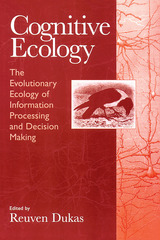
Individual chapters consider such issues as the evolution of learning and its influence on behavior; the effects of cognitive mechanisms on the evolution of signaling behavior; how neurobiological and evolutionary processes have shaped navigational activities; functional and mechanical explanations for altered behaviors in response to changing environments; how foragers make decisions and how these decisions are influenced by the risks of predation; and how cognitive mechanisms affect partner choice.
Cognitive Ecology will encourage biologists to consider how animal cognition affects behavior, and will also interest comparative psychologists and cognitive scientists.
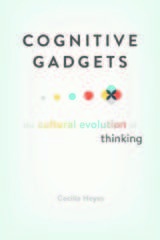
“This is an important book and likely the most thoughtful of the year in the social sciences… Highly recommended, it is likely to prove one of the most thought-provoking books of the year.”—Tyler Cowen, Marginal Revolution
How did human minds become so different from those of other animals? What accounts for our capacity to understand the way the physical world works, to think ourselves into the minds of others, to gossip, read, tell stories about the past, and imagine the future? These questions are not new: they have been debated by philosophers, psychologists, anthropologists, evolutionists, and neurobiologists over the course of centuries. One explanation widely accepted today is that humans have special cognitive instincts. Unlike other living animal species, we are born with complicated mechanisms for reasoning about causation, reading the minds of others, copying behaviors, and using language.
Cecilia Heyes agrees that adult humans have impressive pieces of cognitive equipment. In her framing, however, these cognitive gadgets are not instincts programmed in the genes but are constructed in the course of childhood through social interaction. Cognitive gadgets are products of cultural evolution, rather than genetic evolution. At birth, the minds of human babies are only subtly different from the minds of newborn chimpanzees. We are friendlier, our attention is drawn to different things, and we have a capacity to learn and remember that outstrips the abilities of newborn chimpanzees. Yet when these subtle differences are exposed to culture-soaked human environments, they have enormous effects. They enable us to upload distinctively human ways of thinking from the social world around us.
As Cognitive Gadgets makes clear, from birth our malleable human minds can learn through culture not only what to think but how to think it.
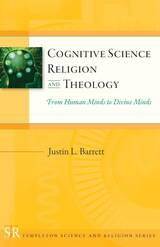
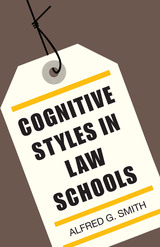
People differ in their cognitive styles—their ways of getting and using information to solve problems and make decisions. Alfred G. Smith and his associates studied these differences in a selected group of over 800 students at a score of law schools throughout the United States. Two major cognitive styles were identified: that of the monopath, who follows a single route of established principles and procedures, and that of the polypath, who takes many routes, as circumstances suggest.
A battery of both original and standard tests was administered to both law students and their professors to investigate differences in cognitive style and their relationships to self-image, anxiety, and academic achievement. This also revealed differences in prevailing styles at different schools.
The results will be of special interest to readers concerned with legal education, to psychologists, and to behavioral scientists. The research format developed here will serve equally well for raising significant questions about the professions of medicine, education, social work, and others in which cognitive and communication styles play a central role in determining outcomes.
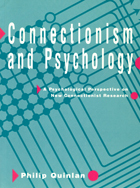
Examples of new connectionist models of learning, vision, language and thought are described in detail. Both neurological and psychological considerations are used in assessing its theoretical contributions. The status of the basic predicates like exclusive-OR is examined, the limitations of perceptrons are explained and properties of multi-layer networks are described in terms of many examples of psychological processes. The history of neural networks is discussed from a psychological perspective which examines why certain issues have become important. The book ends with a general critique of the new connectionist approach.
It is clear that new connectionism work provides a distinctive framework for thinking about central questions in cognition and perception. This new textbook provides a clear and useful introduction to its theories and applications.
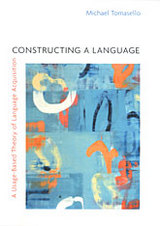
In this groundbreaking book, Michael Tomasello presents a comprehensive usage-based theory of language acquisition. Drawing together a vast body of empirical research in cognitive science, linguistics, and developmental psychology, Tomasello demonstrates that we don’t need a self-contained “language instinct” to explain how children learn language. Their linguistic ability is interwoven with other cognitive abilities.
Tomasello argues that the essence of language is its symbolic dimension, which rests on the uniquely human ability to comprehend intention. Grammar emerges as the speakers of a language create linguistic constructions out of recurring sequences of symbols; children pick up these patterns in the buzz of words they hear around them.
All theories of language acquisition assume these fundamental skills of intention-reading and pattern-finding. Some formal linguistic theories posit a second set of acquisition processes to connect somehow with an innate universal grammar. But these extra processes, Tomasello argues, are completely unnecessary—important to save a theory but not to explain the phenomenon.
For all its empirical weaknesses, Chomskian generative grammar has ruled the linguistic world for forty years. Constructing a Language offers a compellingly argued, psychologically sound new vision for the study of language acquisition.
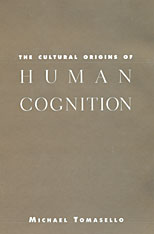
Ambitious and elegant, this book builds a bridge between evolutionary theory and cultural psychology. Michael Tomasello is one of the very few people to have done systematic research on the cognitive capacities of both nonhuman primates and human children. The Cultural Origins of Human Cognition identifies what the differences are, and suggests where they might have come from.
Tomasello argues that the roots of the human capacity for symbol-based culture, and the kind of psychological development that takes place within it, are based in a cluster of uniquely human cognitive capacities that emerge early in human ontogeny. These include capacities for sharing attention with other persons; for understanding that others have intentions of their own; and for imitating, not just what someone else does, but what someone else has intended to do. In his discussions of language, symbolic representation, and cognitive development, Tomasello describes with authority and ingenuity the "ratchet effect" of these capacities working over evolutionary and historical time to create the kind of cultural artifacts and settings within which each new generation of children develops. He also proposes a novel hypothesis, based on processes of social cognition and cultural evolution, about what makes the cognitive representations of humans different from those of other primates.
Lucid, erudite, and passionate, The Cultural Origins of Human Cognition will be essential reading for developmental psychology, animal behavior, and cultural psychology.
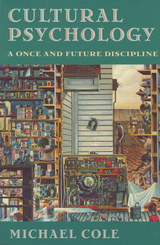
READERS
Browse our collection.
PUBLISHERS
See BiblioVault's publisher services.
STUDENT SERVICES
Files for college accessibility offices.
UChicago Accessibility Resources
home | accessibility | search | about | contact us
BiblioVault ® 2001 - 2024
The University of Chicago Press









